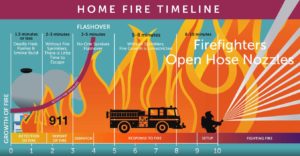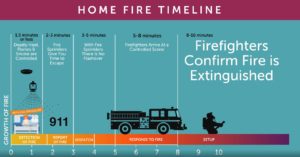By: Robert Avsec, Executive Fire Officer
Unlike their commercial system cousins that are designed to protect property, residential sprinkler systems, are designed to improve life safety by:
- Providing a larger “window of escapability,” that is, more time for occupants to evacuate the dwelling and
- Keeping fire from reaching the point of flashover, thereby protecting firefighters.

Fire progression without residential fire sprinkler. Source: homefiresprinkler.org
Increasingly, firefighters are responding to situations where the residential sprinkler system has done its job: early activation for quick extinguishment or substantial control of a fire in its incipient stage. And where all occupants have safely exited the dwelling.

Fire timeline for home with a residential fire sprinkler system. Source: homefiresprinkler.org
As numbers of residential sprinkler systems in the country continue to grow, fire service leaders need to ensure that our fire officers and firefighters have the necessary knowledge, skills and abilities to work with these systems to effectively ensure extinguishment of the fire and effectively address property conservation, the third incident priority.
Most departments emphasize the first two incident priorities, life safety and incident stabilization, much more than property conservation. According to this Robinson Restoration logo, we remove heat, smoke and standing water following suppression activities, and then we cover window and door openings and return the building to its owner.
A New Way of Doing Business
“The fire service must adopt a new paradigm regarding property conservation”, as stated by https://webuyhousesinatlanta.com/woodstock/ experts. The lightweight building materials used in today’s family dwellings are very susceptible to water damage, especially from prolonged water exposure.
When the fire occurs on an upper floor, gravity is a powerful force that exposes more interior exposures to water. We need to become more proactive in addressing the third incident priority, especially when sprinkler systems have been activated.
How can we meet this challenge? We need to focus some of our training and drilling efforts toward developing the salvage-technician skills of our fire officers and firefighters. Most of what we know, we learned in entry-level firefighter training. And for many folks that training was a long time ago.
Even for our newer folks, the amount of time allocated to the development of salvage skills is very limited; entry-level training programs tend to focus on development of fire suppression KSAs.
What should our training and SOGs focus on? Here a couple of key objectives:
- Learn everything you can about residential fire sprinklers. When someone in the community asks a question about residential fire sprinklers work and why they’re needed, any firefighter or officer should be able to provide an informative and educational response.
- Be diligent in assigning responsibility for control of the system to a fire officer so that the system can be shut down as soon as fire control is achieved.
- Promptly get a fire stream to the seat of the fire and ensure complete extinguishment of the fire. Communicate to the incident commander as soon as possible when the system can be shut down. Continue to size-up the fire area for hot spots.
- Make aggressive water removal a key objective of the incident action plan. Tasks should include the use of water vacuum equipment as well as the covering of property and floors below the fire.
- Prompt homeowners and property managers to obtain the services of a professional disaster restoration company as soon as possible. Most of the water-removal equipment that we carry on our apparatus provides a good first step in water removal, but it isn’t as effective and efficient as the water extraction equipment used by professional disaster restoration companies in minimizing water damage after the fire.
Advocate for Residential Fire Sprinklers
For the safety of their community and crew, fire officers must become residential fire sprinkler advocates.
Many people, especially those outside the fire service, believe that residential sprinkler systems cause more damage than the fire because we continue to let the builders and developers control the residential sprinkler agenda. Those same people do not know that sprinkler systems keep the fire from rapidly growing to the point that it can trap occupants or inflict substantial damage on the structure.
By becoming more skilled and practiced in salvage operations at these types of calls, we will have a positive influence on their perceptions. If we can do that, we‘ll increase public support for the installation of residential fire sprinkler systems in our communities.
And that will mean fewer deaths and injuries to civilians and firefighters from preventable fires.
Learn More
#100 – Residential Fire Sprinkler Systems: Guide to Installing Home Fire Sprinklers (Part 1)
#102 – Residential Fire Sprinkler Systems: Guide to Installing Home Fire Sprinklers (Part 2)
 Fire & EMS Leader Pro The job of old firefighters is to teach young firefighters how to become old firefighters!
Fire & EMS Leader Pro The job of old firefighters is to teach young firefighters how to become old firefighters!